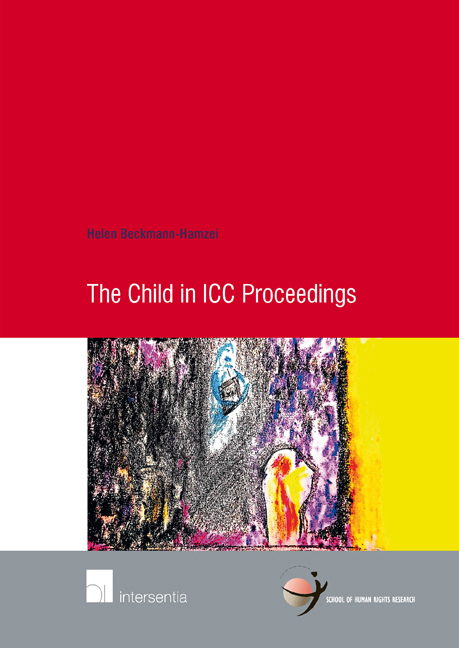Book contents
- Frontmatter
- Acknowledgments
- Contents
- List of Abbreviations
- Introduction
- Chapter 1 Introduction
- Part I The Child in International Criminal Proceedings
- Part II The Child in International Reparation Practice
- Part III Concluding and Comparative Evaluation
- Summary
- Samenvatting
- Selected Bibliography
- Overview of Legislation
- Overview of Cases
- Curriculum Vitae
- Titles Published in the School of Human Rights Research Series
Chapter 1 - Introduction
from Introduction
Published online by Cambridge University Press: 12 December 2017
- Frontmatter
- Acknowledgments
- Contents
- List of Abbreviations
- Introduction
- Chapter 1 Introduction
- Part I The Child in International Criminal Proceedings
- Part II The Child in International Reparation Practice
- Part III Concluding and Comparative Evaluation
- Summary
- Samenvatting
- Selected Bibliography
- Overview of Legislation
- Overview of Cases
- Curriculum Vitae
- Titles Published in the School of Human Rights Research Series
Summary
INTRODUCTORY OBSERVATIONS ON THE CHILD IN INTERNATIONAL LAW
The particular vulnerability of children and their need for specific protection has been translated in legal protection under international law. The main source of legal protection of the child is provided under human rights law. Independent of the situational background, numerous human rights documents address children's need for protection and their particular vulnerability in substantive terms. Children are provided with rights that are intended to protect the material needs of the child, such as nutrition, shelter, education and health care. The Convention on the Rights of the Child (CRC) provides for the most child specific protection in substantive terms. In addition to the general protection guaranteed to the child under human rights law, specific protection is also provided to children during armed conflict and large scale violence. In this regard, human rights law also includes the specific call to protect children from being recruited as child soldiers. The Optional Protocol to the CRC on the Involvement of Children in Armed Conflict focuses in particular on this aspect. International human rights law and international humanitarian law also include specific calls to protect children from suffering during conflict situations.
International criminal law incorporates child specific protection under distinct crime headings. The Statutes of the different international criminal courts and tribunals vary in this regard. The Statutes of the ad hoc tribunals are the most limited. They only contain one crime, which explicitly include the victimisation of children as an element of crime. This is the crime of transferring children from one group to the other as an act of genocide which was copied literally from Article III of the Genocide Convention. A more explicit mention of children as victims of international crimes can be found in the Statute of the SCSL. For the first time in the history of international criminal law, the Statute of the SCSL criminalises the use of child soldiers as a war crime.
- Type
- Chapter
- Information
- The Child in ICC Proceedings , pp. 3 - 28Publisher: IntersentiaPrint publication year: 2015



